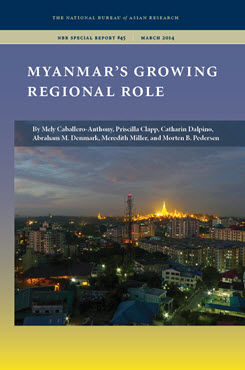Myanmar Foreign Policy in a Time of Transition
This essay is part of the report “Myanmar’s Growing Regional Role,” which explores the issues surrounding Myanmar’s re-emergence as a regional power and outline implications for U.S. policy in relation to Myanmar and Southeast Asia as a whole.
EXECUTIVE SUMMARY
This essay examines the changes and continuities in Myanmar foreign policy under the post-2011 government, with a particular view to elucidating the country’s emerging role in Asia.
MAIN ARGUMENT
Like every government of Myanmar since independence, the new quasi-civilian government has pursued an independent, nonaligned, and active foreign policy. With domestic political reforms gathering momentum, however, it has been able to leave behind the essentially defensive, inward-looking policies of past security-oriented administrations and greatly increase interaction with the outside world in pursuit of national development. Over the past three years, the government has thus moved aggressively to normalize Myanmar’s international relations, rebalance bilateral relations with the major powers, and further integrate the country into the region. At the same time, it has taken steps to ensure that new foreign aid, trade, and investment genuinely benefit the country and its people rather than just a narrow economic elite.
POLICY IMPLICATIONS
- While Myanmar’s resurgence has added fuel to the long-simmering strategic competition in the country between the major powers, the new government continues to eschew alliances in favor of friendly, mutually beneficial relations with all nations.
- Despite potentially emerging as one of the more liberal members of ASEAN, Myanmar is unlikely to want to push its own values on other members or change the political modus operandi of the organization, at least in the short term.
- The most immediate impact of Myanmar’s new foreign policy is economic. Major business opportunities are opening up in the country, especially for responsible, rule‑based investors.
- At the same time, Myanmar’s efforts to strengthen connectivity with its neighbors could remove a major barrier to interregional economic integration.


